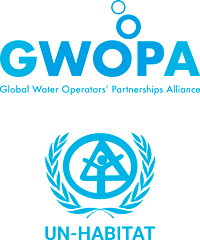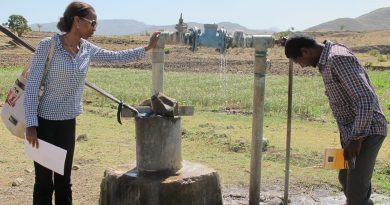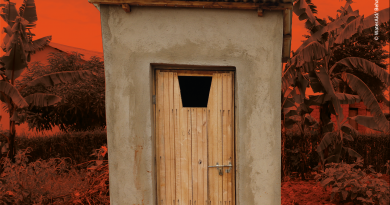GWOPA’s Reflections on COP 28
For GWOPA, COP 28 was about advocating the effectiveness of Water Operators` Partnerships (WOPs) and Sanitation-focused Water Operator Partnerships (SWOPs) and emphasising water and sanitation operators’ significant roles in climate adaptation and mitigation. GWOPA was a core partner of Water Pavilion, led the “Locally led Adaptation” day programme of the Water Pavilion, launched the GWOPA’s Sanitation Strategy, and became a co-lead in the Resilient Utilities Sub-Working group the COP28 Presidency`s new initiative: The Sharm El-Sheikh Adaptation Agenda on Urban Water Resilience Initiative.
Key takeaway messages from Locally led Adaptation Day at the Water Pavilion
- Water, as a public good and a vital component of climate adaptation, and water adaptation holds numerous benefits for health, resilience, prosperity, and a sustainable future for all.
- Establishing a robust institutional framework and bolstering the capabilities of water and sanitation operators are crucial steps for effectively implementing technical solutions in climate adaptation and mitigation.
- The Water and Sanitation-focused Operator Partnerships (WOPS and SWOPs) play a critical role in enhancing the capacity of service providers, enabling them to offer services universally and transform into financially viable institutions that attract funding for infrastructure and climate adaptation.
- Finance is a pivotal accelerator for achieving SDG6 and climate adaptation. The widening gap between required and committed resources underscores the need for additional funding sources and transformative initiatives, like the Urban Water Catalyst Initiative, to support capacity building in the water and sanitation sector.
- In urban settings, water and sanitation act as catalysts for building resilience. Collaboration with key stakeholders, particularly utilities serving as frontline agents, is essential. Success hinges on participatory planning and seamless integration across sectors.
- Wastewater treatment emerges as a crucial element in the climate change discourse. Treatment facilities can offer multiple benefits, including serving as energy hubs and producing organic fertiliser and reusable water for agriculture. Collaboration with utilities is vital to enhance capacity and secure infrastructure investment and financing in wastewater treatment.
- Strong collaboration is essential across stakeholders and sectors to develop innovative, scalable, low-cost solutions for a circular water approach. Introducing the circular water approach in urban areas is imperative to enhance water-use efficiency.
Water Pavilion: Locally-led Adaptation Day

The session records of the Locally-led Adaptation day are available as follows.
Panel 1: Finance, data and capacity building: accelerating the transition towards water-smart cities
Panel 2: Urban water resilience: local adaptation policies and best practices; and UN-2023 Water Action Agenda: A Water Smart Journey to COP28
High-level panel: Policy Implications of a Multi-Level Governance Approach for Water Adaptation in Cities
Multi-Level Action and Urbanization Pavilion: Make Cities Water Secure: Key Strategies for Water and Wastewater Utilities
COP28 was also a significant event for us to launch our “Towards a Sanitation Strong GWOPA Strategy“. This is the GWOPA’s sanitation strategy that aims to ensure the boosting of sanitation consideration across the Alliances’ strategic plan. The strategy was launched at the side event “Make Cities Water Secure: Key Strategies for Water and Wastewater Utilities”, co-hosted by UN-Habitat/GWOPA, the Government of France, and The Deutsche Gesellschaft für Internationale Zusammenarbeit (GIZ). The strategy set the stage for new work areas for the Alliance in 2024 in building the sanitation sector capacity through the Sanitation-focused Water Operators’ Partnership (SWOP) approach.
Watch the session record of Make Cities Water Secure: Key Strategies for Water and Wastewater Utilities
Waste and Resources Pavilion
GWOPA participated in the panel discussion on “Ensuring efficient coordination of Water Resources, Solid waste management and Sanitation in a climate resilient world”, organised by UN-Habitat, the Government of France, the French Water Partnership, and the French Solid Waste Partnership at the Water and Resources Pavilion
The discussion concluded that there is a need for intersectoral collaboration with solid waste management to build urban water resilience.
COP28 Presidency launched the Sharm El-Sheikh Adaptation Agenda Working Group on Urban Water Resilience
A technical working group consisting of non-state urban water sector actors was convened by the UNFCCC Sharm el-Sheikh Adaptation Agenda (SAA) and the COP28 Presidency. The group’s objective is to integrate these actors into global climate actions by setting shared 2030 targets. Additionally, the group aims to improve collaboration among city stakeholders and connect city networks with national Parties. Participants will share their experiences and demonstrate how their initiatives collectively support the achievement of urban water-related 2030 targets outlined in the SSA agenda.
As part of the SAA, GWOPA’s role is to co-lead the Resilient Water Utilities Sub-Working Group of the Sharm El Sheck Adaptation Agenda on Urban Water Resilience Initiative.




